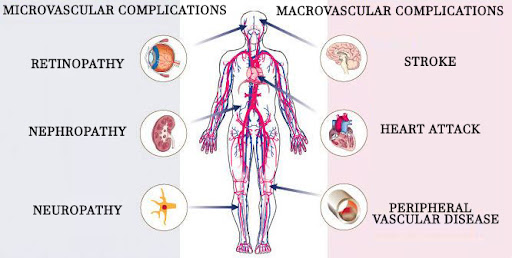Long COVID News: Study Shows Majority Of Young Healthy Adults Will Exhibit Peripheral Macrovascular And Microvascular Complications Following COVID-19
Source: Long COVID News Sep 17, 2021 3 years, 6 months, 2 weeks, 18 hours, 39 minutes ago
Long COVID News: A new study by researchers from the University of Texas-Arlington shows that young and otherwise healthy adults would suffer persistent peripheral macrovascular and microvascular complications following ‘recovery’ from COVID-19.

The study was the first to investigate the persistent effects of COVID-19 on vascular function in otherwise healthy young adults.
The study findings demonstrated that peripheral macrovascular and microvascular vasodilation was significantly blunted in young adults still symptomatic from COVID-19 beyond the acute phase (>4 wk from diagnosis), whereas those who become asymptomatic have similar vascular function compared with controls who never had COVID-19. In contrast, cerebral vascular function and central arterial stiffness were unaffected irrespective of COVID-19 symptomology.
Numerous past studies and
Long COVID News suggest that COVID-19 causes vascular dysfunction during the acute phase of the illness in otherwise healthy young adults. To date no studies have investigated the longer-term effects of COVID-19 on vascular function.
The study team hypothesized that young, otherwise healthy adults who are past the acute phase of COVID-19 would exhibit blunted peripheral (brachial artery flow-mediated dilation (FMD) and reactive hyperemia) and cerebral vasodilator function (cerebral vasomotor reactivity to hypercapnia; CVMR) and increased central arterial stiffness.
A total of sixteen young adults who were at least 4 wk past a COVID-19 diagnosis and 12 controls who never had COVID-19 were studied. Eight subjects with COVID-19 were symptomatic (SYM) and eight were asymptomatic (ASYM) at the time of testing.
The study findings found that FMD and reactive hyperemia were not different between COVID and control groups. However, FMD was lower in SYM (3.8 ± 0.6%) compared with ASYM (6.8 ± 0.9%;
P = 0.007) and control (6.8 ± 0.6%;
P = 0.003) with no difference between ASYM and control.
Similarly, peak blood velocity following cuff release was lower in SYM (47 ± 8 cm/s) compared with ASYM (64 ± 19 cm/s; P = 0.025) and control (61 ± 14 cm/s; P = 0.036). CVMR and arterial stiffness were not different between any groups. In summary, peripheral macrovascular and microvascular function, but not cerebral vascular function or central arterial stiffness were blunted in young adults symptomatic beyond the acute phase of COVID-19. In contrast, those who were asymptomatic had similar vascular function compared with controls who never had COVID-19.
The study findings were published in the peer reviewed journal: Heart and Circulatory Physiology (American Journal Of Physiology )
https://journals.physiology.org/doi/full/10.1152/ajpheart.00368.2021
Lead author
Dr Damsara Nandadeva from the Department of Kinesiology, University of Texas at Arlington told Thailand Medical News, “It is intriguing that those with persistent [COVID-19] symptoms exhibited peripheral vascular dysfunction, whereas those who were asymptomatic at the time of testing had similar macrovascular and microvascular vasodilation to controls.”
It should be noted that adults 29 years of age and younger makeup only 16% of the U.S. population but account for over 7 million, or 22%, of U.S. COVID-19 infections.
Although more research is needed to fully understand the extent of the problem, one study found that as many as 1 in 4 adults ages 18 to 39 reported symptoms weeks or months after the initial acute phase of COVID-19 infection.
Dr Nandadeva explained, “Long COVID,” also called post-acute sequelae of SARS-COV-2 infection (PASC), is an umbrella term for the condition the U.S. Centers for Disease Control and Prevention refers to as “a lack of return to a usual state of health following acute COVID-19 illness.”
It has been found that individuals with long COVID report a variety of symptoms, including cognitive impairment, headache, and lightheadedness, which can be indicative of impairments to blood vessels supporting the brain.
The study team from the University of Texas at Arlington investigated brain and peripheral blood vessel function of 16 young adults who had tested positive for COVID-19 more than four weeks prior. Eight of the study subjects currently had COVID-19 symptoms and eight did not. Researchers then compared them to 12 peers who tested negative.
Interestingly, symptomatic participants showed “significantly blunted” dilation of both large and small blood vessels in their limbs. However, despite previous studies showing stiffening of central arteries in young adults with acute COVID-19, long COVID participants in this study showed no such stiffening, nor did they show impaired function in the blood vessels that support the brain.
Also it was observed that asymptomatic COVID-19–positive participants showed function similar to controls, offering hope that once symptoms resolve so may vascular impairments.
However during these vulnerable phases, affected individuals should constantly be monitored and should go for frequent checkups to ensure no serious or fatal events arises.
For more
Long COVID News, keep on logging to Thailand Medical News.
